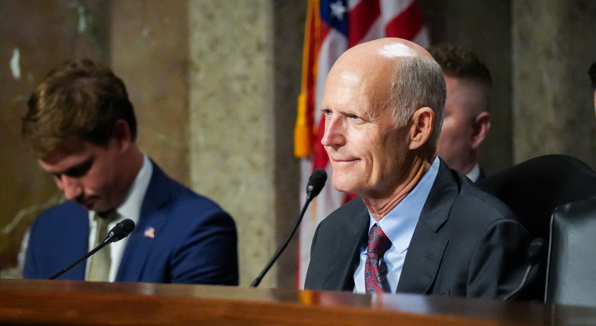VIDEO RELEASE Chairman Rick Scott Leads Committee Hearing on How Sports Medicine Can Advance Healthier Aging
WASHINGTON, D.C. – Yesterday, Senator Rick Scott, Chairman of the U.S. Senate Special Committee on Aging, convened the committee’s tenth hearing of the 119th Congress: “Lessons from the Field: How Sports Medicine Can Improve Health Outcomes for Seniors” to discuss how sports medicine principles can be adapted successfully to promote healthier aging. During the hearing, committee members heard from medical experts, athletes, and advocates as they shared their insights on how sports medicine can be used to support aging Americans. These experts discussed practical techniques to enhance mobility, prevent common injuries, reduce long-term health care spending, and improve the overall well-being among older adults. The conversation also emphasized the importance of coordinated care, educating patients about physical health starting at a young age, and expanding access to local programs that encourage safe, active lifestyles throughout life.
Chairman Scott’s witnesses for the hearing included Dr. E. Lyle Cain, Jr., Orthopaedic Surgeon and Team Physician at the University of Alabama; Dr. Paul S. Legg, Orthopaedic Surgeon and Team Physician at the University of Charleston in West Virginia; and former NFL Quarterback Matt Hasselbeck.

Watch Chairman Scott’s full remarks HERE. Read Chairman Scott’s remarks as prepared for delivery below:
The U.S. Senate Special Committee on Aging will now come to order.
As we have heard from expert witnesses in previous hearings, staying active is one of the most effective ways for older Americans to prevent disease, improve mental health, and increase longevity.
Too often, Congress holds hearings on problems, listens to solutions, and then never takes action to keep the conversation going and put good ideas into practice.
It sounds crazy, but that’s the norm in Washington and I don’t think any of our good members of the Aging Committee want to keep following this broken tradition.
So, I was excited to put this hearing together today, at the urging of my good friend from Alabama, Senator Tommy Tuberville, to ask an interesting question that perhaps only a coach might come up with…
How can we take the lessons learned in sports medicine, and all the innovation that goes into injury prevention and enhanced recovery for America’s elite athletes, and use that knowledge to improve the lives of American seniors?
Senator Tuberville has spent his life on the football field, and he’s seen just how much sports medicine has changed over the years, and how the innovations in this field have helped keep athletes healthier, and recover from injury faster.
But the rest of us probably don’t realize that some of the most promising tools for healthy aging are already being used on the sidelines of football fields, training rooms, and sports clinics around the country.
Now it’s up to us to use our jobs in the Senate to embrace innovation, wherever it’s found, and help break the cycle of good ideas coming to Washington to sit on a shelf.
In today’s hearing, we will explore how the science and techniques developed for elite athletes can be applied to enhance the lives of older Americans, enabling them to stay stronger, recover more quickly, and maintain their independence as they age.
Sports medicine, with its emphasis on preventing injuries and promoting proper recovery, offers a new pathway to longevity and health for America’s aging population.
As we consider how to support our seniors, we must draw lessons from the best in the field – literally.
The goal is not for seniors to become athletes, but for them to benefit from the same principles: injury prevention, rehabilitation, strength training, and recovery.
These are tools for everyone, whether you’re playing under the Friday night lights or walking your grandkids to school.
As many of you know, Florida has a vibrant senior population and some of the best collegiate and professional sports teams, and I am proud to support them all.
Today, we will hear from medical experts with real-world experience in treating both athletes and older adults.
We will also hear from a former professional quarterback who knows firsthand how sports medicine can help protect against aging injuries and lead to a longer, healthier life.
###